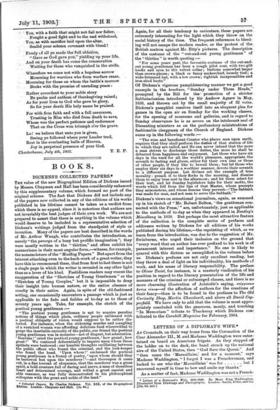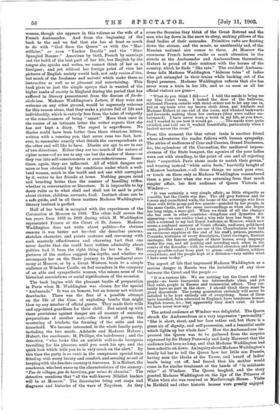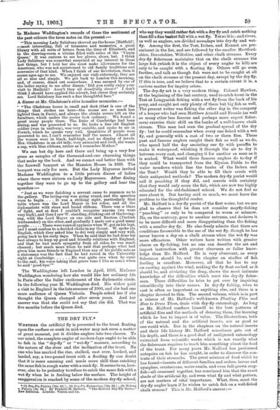LETTERS OF A DIPLOMAT'S WIFE.*
AT Cronstadt, on their way home from the Coronation of the Czar Alexander III., M. and Madame Waddington were enter- tained on board an American frigate. As they stepped of the ladder on to the deck, the band struck up the national airs of the United States, then " God Save the Queen." And " then came the Marseillaise,' and for a moment," says Madame Waddington, " I forgot I was a Frenchwoman, and
looked to see who the ' Marseillaise ' was for but I recovered myself in time to bow and smile my thanks."
As a matter of fact, Madame Waddington was not a French-
• Letters of a Diplomat's Wife, 1883-1900. By Mary King Waddington. Illustrated from Drawings and Photographs. Loudon Smith, Elder, and Co. [108. 6d, net.]
woman, though she appears in this volume as the wife of a French Ambassador. And from the beginning of the book to the end we feel that she has at least as much to do with " God Save the Queen " as with the " Mar- seillaise," or even " Yankee Doodle " and the " Star-
Spangled Banner." American by birth, French by marriage and the habit of the best part of her life, but English by the tongue she speaks and writes, we cannot think of her as a foreigner; and yet without her foreign point of view her pictures of English society would lack, not only raison d'etre, but much of the freshness and naivete which make them so instructive as well as so pleasant and entertaining. This book gives us just the simple apercu that is wanted of the higher ranks of society in England during the period that has suffered in literary presentment from the disease of fin-de- sieele-iem. Madame Waddington's Letters, if they were not welcome on any other ground, would be supremely welcome for this reason alone, that they make a picture full of life and individuality, which is entirely free from the taint of vulgarity or the consciousness of being " smart." More than once in the course of an intimate letter the writer' regrets that she has not kept a diary. The regret is superfluous. No diaries could have been better than these vivacious letters, written with a running pen, that never runs too fast, how- ever, to remember exactly what details the correspondents at the other end will like to have. Diaries are apt to err in one of two directions. Either they are too much of the nature of cipher notes—of no use to any one but the maker of them—or they run into self-consciousness or over-reflectiveness. Some- times, again, they are indiscreet. All of which dangers are more or less obviated by the conditions under which a well- bred woman, much in the world and not one whit corrupted by it, writes to her friends at home. Nothing gauges mind and breeding better than the manner of handling trifles, whether in conversation or literature. It is impossible to lay down rules as to what shall and shall not be said in print about clothes, children, servants, food. Instinct alone can be a safe guide, and in all these matters Madame Waddington's literary instinct is perfect.
Half of her book is occupied with the experiences of the Coronation at Moscow in 1883. The other half covers the ten years from 1883 to 1893 during which M. Waddington represented France at the Court of St. James. Madame Waddington does not write about politics—for obvious reasons it was better not to—but she describes persons, sketches character, and paints costume and ceremony with such masterly effectiveness and charming tact that one never doubts that she could have written admirably about politics had it been the right thing for her to do. Her pictures of the surface suggest the depths, and whether we accompany her on the State journey to the mediaeval cere- mony at Moscow, or by a Great Western train to a simple audience at Windsor Castle, we feel ourselves in the company of an able and sympathetic woman, who misses none of the historical associations or social significances of the occasion.
The book begins with the pleasant bustle of preparation in Paris when M. Waddington was chosen for the special " Ambassade." It was an honour, but an honour not without drawbacks. There was the fear of a possible attempt on the life of the Czar, of exploding bombs that might blow up any number of official guests. They made their wills and appointed guardians for their child. But mixed up with these provisions against danger are all manner of amusing preparations of another sort,—the choice of gowns, the mustering of trinkets, the forming of the suite and the household. We become interested in the whole family party, including the two maids, Adelaide and Madame Hubert ; Hubert, the coachman; M. Phillipe, the hairdresser ; and the detective, "who looks like an amiable well-to-do bourgeois travelling for his pleasure, until you meet his eye, and the quick look which tells you he is very much on the alert." By this time the party is en route in the sumptuous special train fitted up with every luxury and comfort, and seeming so out of keeping with the desolate country it traverses. It is Hubert, the coachman, who best sums up the characteristics of the scenery: "Pas de villages, pas de barrieres, pas mime de Chemins." The detective mentions that " all the well-known Nihilist leaders will be at Moscow." The Secretaries bring out maps and diagrams and histories of the wars of Napoleon. As they cross the Beresina they think of the Great Retreat and the men who lay down in the snow to sleep, making pillows of the dead bodies of their comrades. Primitive rafts are floating down the stream, and the music, so unutterably sad, of the Russian national airs comes to them. At Moscow the enormous French horses excite as much attention in the streets as the Ambassador and Ambassadress themselves. Hubert is proud of their contrast with the horses of the country, which he finds "like rats." The resident Ambassa- dress tells Madame Waddington " hideous tales " of ladies who get entangled in their trains while backing out of the Royal presence. Madame Waddington reflects that she has
never worn a train in her life, and so as soon as all her official visitors are gone— "What do you think I did—? I told the maids to bring me my blue Court train. I locked the door of the ballroom, stationed Pierson outside with strict orders not to let any one in, put on my train over my brown cloth dress, put Adelaide and Madame Hubert at one end of the room, and whisked backwards and forwards, making them low curtseys (they were rather em- barrassed). I have never worn a train in my life, as you know,
and I wanted to see how it would go The maids were quite satisfied, and told me it worked beautifully, particularly when I backed across the room."
From this moment the blue velvet train is another friend whose adventures the reader follows with human sympathy. The series of audiences of Czar and Czarina, Grand Duchesses, &c., the splendour of the Coronation, the mediaeval impres- siveness of the State banquet, the agonies of the poor ladies worn out with standing, to the point of one and all rejecting their " coquettish Paris shoes made to match their gowns," and wearing instead "white satin boats," hurriedly bought of a Moscow bootmaker,—all these things we must pass over, or touch on them only as Madame Waddington remembered them a year later when she was returning from that much simpler affair, her first audience of Queen Victoria at Windsor:— " It was certainly a very simple affair; as little etiquette as possible, but the Castle was fine. The old grey fortress and its towers and crenellated walls, the home of the sovereign who lives there with little pomp and few guards—guarded by her people, in the same Castle, and the same surroundings as when she began her long reign, a mere girl. When we think of all the changes she has seen in other countries—kingdoms and dynasties dis- appearing—we can realise what a wise rule hers has been. It is such a contrast to my last Royal Audience at Moscow, which now seems a confused memory of Court officials, uniforms, gold-laced coats, jewelled canes (I can see one of the Chamberlains who had an enormous sapphire at the end of his staff), princes, peasants, Cossacks, costumes of every description, Court carriages, Russian carriages, the famous attelage of three horses, every language under the sun, and all jostling and crowding each other in the courts of the Kremlin—with its wonderful churches and domes of every possible colour from pink to green—only soldiers, soldiers everywhere, and the people kept at a distance—very unlike what I have seen to-day."
The aspect of life that impressed Madame Waddington as a serious danger in Russia, was the invisibility of any class
between the Court and the people :—
"It is a curious life. We see nothing but the Court and the people—no haute bourgeoisie nor intermediate class, and yet they exist, people in finance and commercial affairs. They cer- tainly have no part in the show. I should think there must be great discontent. The young generation certainly will never be satisfied to be kept entirely out of everything. Some of them have travelled, been educated in England, have handsome houses, English horses, &c. ; but apparently they don't exist. At least we have never seen any."
The actual audience at Windsor was delightful. The Queen struck the Ambassadress as a very impressive "personality." "She is short, stout, and her face rather red, but there is a great air of dignity, and self-possession, and a beautiful smile which lights up her whole face." How the Ambassadress im- pressed the Queen was to be gathered from the surprise expressed by Sir Henry Ponsonby and Lady Harcourt that the audience had been so long, and that Madame Waddington had been asked to sit down. An inquiry about Madame Waddington's family led her to tell the Queen how her little son Francis, having seen the blocks at the Tower, and heard of ladies' heads being cut off, had feared that his mother would come in for similar treatment at the hands of "la mechante rein" at Windsor. The Queen laughed, and the story greeted Madame Waddington on the lips of the Princess of Wales when she was received at Marlborough House. Visits to Hatfield and other historic houses were greatly enjoyed In Madame Waddington's records of these the sentiment of the past colours the terse notes on the present :— " This morning Lady Salisbury showed me the house [Hatfield], —most interesting, full of treasures and memories, a great library with all sorts of letters from the time of Elizabeth, and in the drawing-room a vitrine filled with relics of the Virgin Queen.' It was curious to see her gloves, shoes, hat. I think Lady Salisbury was somewhat surprised at my interest in these last things, but I told her she must make allowances for the American, who was not accustomed to old family traditions and souvenirs of that kind. When I think of our Revolution, then it seems ages ago to me. We enjoyed our visit extremely, they are
all so nice and simple. We got back to London this morning, and, of course, dined out somewhere. I was amused by one of the ladies saying to me after dinner, Did you really enjoy your visit to Hatfield? Aren't they all dreadfully clever?' I don't think I should have applied the adverb, but clever they certainly are. Lord Salisbury has such a fine thoughtful face."
A dinner at Mr. Gladstone's stirs homelier memories "The Gladstone house is small and dark (that is one of the things that strikes me here—the rooms are so much less lighted than in Paris), and always the chintz covers left on the furniture, which makes the rooms look ordinary. We found a great many people there. The Duke of Cambridge had been dining, and was presented to us. He looks a fine old English soldier (was in uniform), was very amiable, and spoke to me in French, which he speaks very well. Quantities of people were presented to me, I can't remember half the names. Almost all the women were in black, half-high, and no display of jewels. Mrs. Gladstone is an old lady, very animated and civil, she wears a cap, with blue ribbons, rather as I remember Mother."
We can but dip here and there and bring up a very few gems as samples of the thousand-and-one charming things that make up the book. And we cannot end better than with the farewell banquet at the Mansion House in 1893. The banquet was only for men. But the Lady Mayoress invited Madame Waddingt4in to a little private dinner of ladies where there were sixteen ex-Lady Mayoresses. After dining together they were to go up to the gallery and hear the speeches :-
" Just as we were finishing a servant came to summon us to the gallery. The loving-cup was going round, and the speeches were to begin. . . . It was a striking sight, particularly that table where was the Lord Mayor in his robes, and all the diplomatists with stars and broad ribbons. There was a blaze of light, and at first I couldn't recognise anyone (we were very high), and then I saw W. standing, drinking out of the loving- cup, with the Lord Mayor on one side and Rustem (Turkish Ambassador) on the other, and gradually I made out a good many
people There were roars of applause when W. got on his legs, and I must confess to a decided choke in my throat. W. spoke (in English, which they asked him to do) very simply and very well, going back to his early days When he said that he had done his best always to keep up good and friendly relations with England, and that he had much sympathy from all sides, he was much cheered ; but much more when he said that perhaps what had given him more friends in England than any of his public acts as a statesman was the fact that he had rowed in the University eight at Cambridge He was quite emu when he came to the end; his voice taking that grave tone I like so much when he said good-bye."
The Waddington left London in April, 1893, Madame Waddington wondering how she would like her ordinary 1:fe in Paris after the fuller excitement of the diplomatic circle.
In the following year M. Waddington died. His widow paid a visit to England in the late summer of 1900, and she had one more audience of Queen Victoria. People asked her if she thought the Queen changed after seven years. And her answer was that she could not say that she did. That was five months before the Queen died.








































 Previous page
Previous page